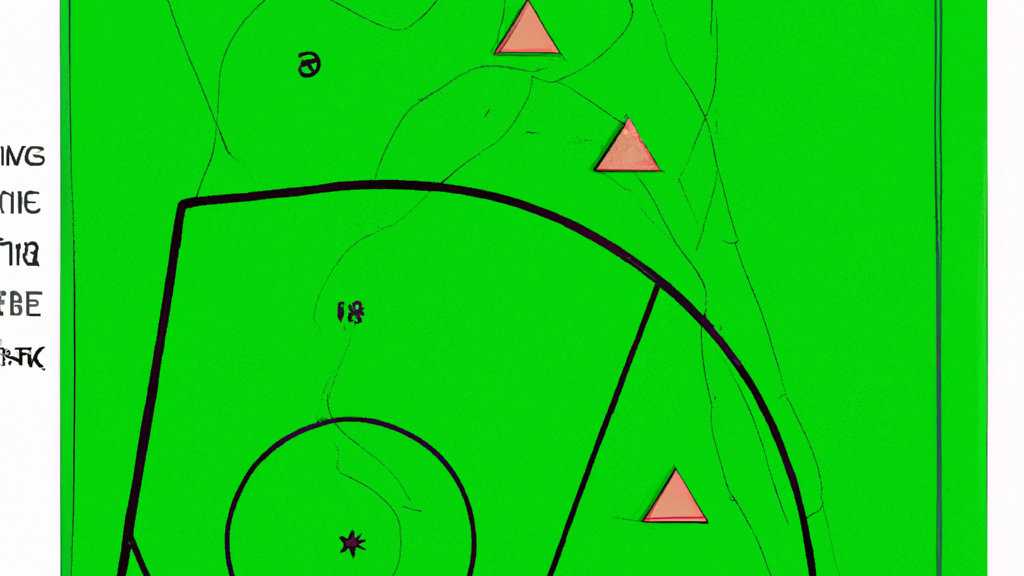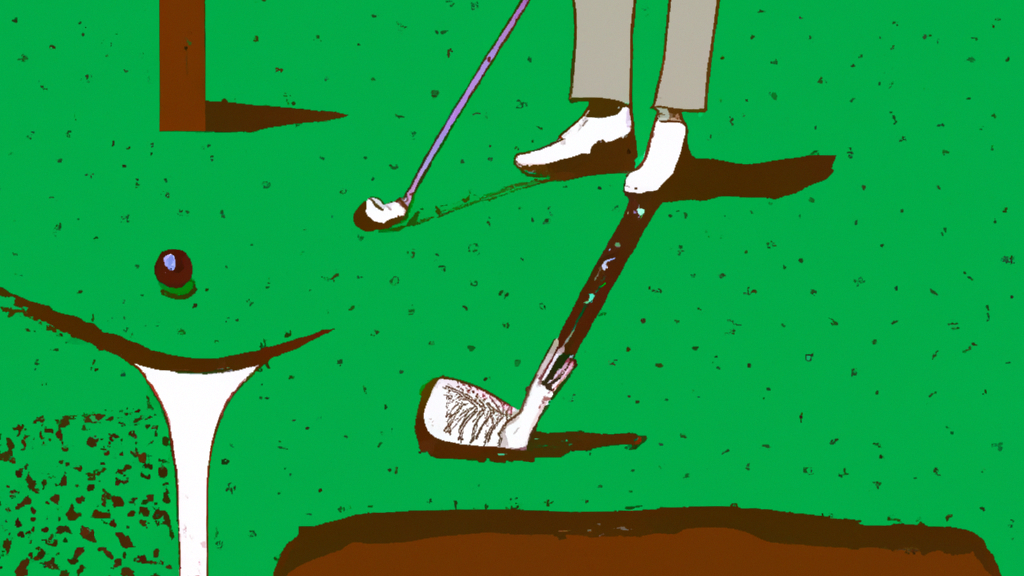THE MENTAL GAME OF SHORT GAME SHOTS: OVERCOMING FEAR AND DOUBT IN CHIPPING AND PITCHING
Golf is a game of precision, and nowhere is that more evident than in the short game. Chipping and pitching require a deft touch and a steady hand, but they also demand a strong mental game. Fear and doubt can creep in, causing even the most skilled golfers to falter. That’s why mastering the mental game of short game shots is essential for success on the course. In this article, we’ll explore the strategies and techniques that can help you overcome fear and doubt in chipping and pitching.
From visualization and positive self-talk to mindfulness and breathing exercises, we’ll cover the tools you need to stay calm, focused, and confident under pressure. Whether you’re a seasoned pro or a weekend warrior, these tips will help you take your short game to the next level. So, let’s dive in and discover the mental game of short game shots.

Golf is a game of precision and skill, and nowhere is this more evident than in the short game.
Chipping and pitching require a delicate touch and a steady hand, but they also require a strong mental game. Fear and doubt can creep in and wreak havoc on even the most skilled golfer’s short game. In this article, we will explore the mental game of short game shots and provide tips for overcoming fear and doubt in chipping and pitching.
Understanding the Sources of Fear and Doubt
Fear and doubt often arise from a lack of confidence in one’s ability to execute the shot. This lack of confidence can stem from a variety of sources, including:
- Past failures
- Negative self-talk
- Pressure to perform
Past Failures
One of the most common sources of fear and doubt in chipping and pitching is past failures. If you have missed a crucial chip or pitch in the past, it can be difficult to shake the memory and the fear of repeating the mistake. This fear can lead to hesitation and a lack of commitment to the shot, which can ultimately result in another missed opportunity.
Negative Self-Talk
Negative self-talk is another common source of fear and doubt in chipping and pitching. If you are constantly telling yourself that you are not good enough or that you will never be able to execute the shot, you are setting yourself up for failure. This negative self-talk can become a self-fulfilling prophecy, as it can lead to a lack of confidence and a lack of commitment to the shot.
Pressure to Perform
Pressure to perform is another source of fear and doubt in chipping and pitching. Whether it is the pressure of a tournament or the pressure of playing with friends or colleagues, the fear of failure can be overwhelming. This pressure can lead to a lack of confidence and a lack of commitment to the shot, which can ultimately result in another missed opportunity.
Overcoming Fear and Doubt
So, how can you overcome fear and doubt in chipping and pitching? The first step is to recognize the source of your fear and doubt. Once you understand where it is coming from, you can begin to address it.
Visualization
One effective way to overcome fear and doubt in chipping and pitching is to practice visualization. Visualization is the process of creating a mental image of the shot you want to execute. By visualizing the shot in your mind, you can build confidence and reduce fear and doubt.
To practice visualization, start by closing your eyes and imagining the shot you want to execute. See the ball landing softly on the green and rolling towards the hole. Imagine the sound of the ball hitting the green and the feeling of satisfaction as you watch it roll towards the hole. Repeat this visualization process several times until you feel confident and ready to execute the shot.
Positive Self-Talk
Another effective way to overcome fear and doubt in chipping and pitching is to practice positive self-talk. Positive self-talk is the process of replacing negative thoughts with positive ones. By focusing on positive thoughts and affirmations, you can build confidence and reduce fear and doubt.
To practice positive self-talk, start by identifying the negative thoughts that are holding you back. For example, if you are telling yourself that you will never be able to execute the shot, replace that thought with a positive affirmation such as “I am capable of executing this shot with confidence and precision.” Repeat this affirmation several times until you feel confident and ready to execute the shot.
Relaxation Techniques
Another effective way to overcome fear and doubt in chipping and pitching is to practice relaxation techniques. Relaxation techniques such as deep breathing and progressive muscle relaxation can help reduce anxiety and increase focus and concentration.
To practice deep breathing, start by taking a deep breath in through your nose and exhaling slowly through your mouth. Repeat this process several times until you feel relaxed and focused.
To practice progressive muscle relaxation, start by tensing the muscles in your body one at a time and then releasing the tension. For example, start by tensing the muscles in your feet and then releasing the tension. Move up your body, tensing and releasing the muscles in your legs, abdomen, arms, and neck. Repeat this process several times until you feel relaxed and focused.
Regular Practice
In addition to these techniques, it is important to remember that chipping and pitching are skills that can be developed and improved with practice. By practicing regularly and focusing on your technique, you can build confidence and reduce fear and doubt.
Conclusion
The mental game of short game shots is a crucial aspect of golf. Fear and doubt can creep in and wreak havoc on even the most skilled golfer’s short game. By understanding the sources of fear and doubt and practicing visualization, positive self-talk, relaxation techniques, and regular practice, you can overcome these obstacles and improve your chipping and pitching skills. With a strong mental game and a steady hand, you can become a master of the short game and take your golf game to the next level.

- Golf Emergency: Get rid of the Shanks – The Left Rough
But, like anything in golf you can overcome the bad shot by learning why it … serious doubt the next time you have a similar shot making you play in fear. - Have the chipping yips? Here’s a drill to help – GolfWRX
Eventually, these poor shots erode confidence, and your brain starts tell your body you can’t handle the shot at hand. This inner doubt leads to some … - How to Cure the Yips During Chip Shots (Short Game Yips) – Golf …
Dec 1, 2021 … You approach the next chip shot in doubt and fear about if the chipping yips are going to happen again. As you set up to the ball, the doubt … - 8 situations most golfers fear—and how to overcome them …
Jan 18, 2021 … Then step in and swing, making sure the club hits the turf after it strikes the ball. ROUGH SHOTS. /content/dam/ … - How to get over a golf sand trap, first shot every time – Golf Habits
Jul 1, 2020 … How to select the right golf club to hit their chip shot with each … So, how does the golfer overcome the emotions of fear, anxiety, doubt … - Cures For The Chipping Yips – Instruction For The Mental Game of Golf
Jan 25, 2016 … As you approach your ball after missing a green, that doubt gets stronger. Instead of having 100% focus on the shot at hand (how you are going … - Why Can’t I Chip? How To Cure Your Chipping Yips – Project Golf …
Additionally, decelerating through a chip is a recipe for thin shots, … doubt that chipping is an integral part of the game and anxiety over the ball can … - Golf Books – John Hoskison
Imagine how many shots you could save if you could chip and pitch like a pro? Your Short Game Silver Bullet describes the missing link between the chipping … - 6 Mental Game Tips for Confident Putting | Beat Golf Putting and …
Golfers who get the putting yips learn to fear and doubt putting. … Breaking The Yips Cycle: How to Putt, Chip, And Pitch Freely and Enjoy Playing Golf … - Golf Yips Cures – How To Overcome Yips & Anxiety To Improve …
May 18, 2022 … A common issue for many golfers is experiencing ‘the golf yips’, traditionally during the short game (pitch shots, chip shots and putts).
Interesting facts about The Mental Game of Short Game Shots: Overcoming Fear and Doubt in Chipping and Pitching
- Golf is one of the oldest sports in the world, with evidence of a similar game being played in ancient Rome.
- The first recorded game of golf was played in Scotland in 1457.
- The term “caddie” comes from the French word “cadet,” meaning younger son or assistant.
- The Masters Tournament, held annually at Augusta National Golf Club, is one of the most prestigious events on the professional golf circuit and has been held since 1934.
- Tiger Woods holds numerous records within professional golf, including being tied for most PGA Tour wins (82) and holding the lowest scoring average for a season (68.17).
- In addition to physical skill and technique, mental toughness plays a crucial role in success on the golf course.
- Many famous athletes from other sports have taken up golf as a hobby or second career after retiring from their primary sport, including Michael Jordan and Tony Romo.





